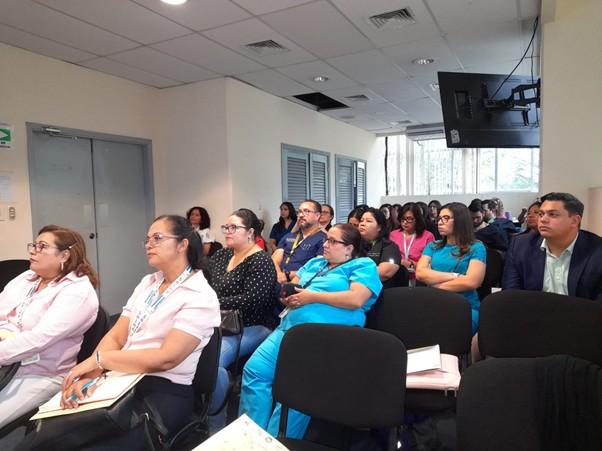Participation of the TGHN LAC Honduras Project in the Workshop “How to Prepare a Clinical Case for Publication”
Date: Wednesday, April 23, 2025
Location: Auditorium of the Forensic Medicine Directorate, Tegucigalpa, Honduras
Organizers: Honduran Journal of Forensic Sciences, Hospital de Especialidades San Felipe, Academic Management and Research Department of the Hospital Escuela, and The Global Health Network Latin America and the Caribbean (TGHN LAC)
As part of efforts to strengthen clinical and scientific research capacity, the training session titled “How to Prepare a Clinical Case for Publication” was held, organized by the Honduran Journal of Forensic Sciences in collaboration with Hospital San Felipe and the TGHN LAC Honduras Project. The activity was directed at healthcare professionals.
The objective of the session was to enhance skills in writing and publishing clinical case reports, emphasizing clear narrative structure and the application of ethical and scientific principles in writing. The program included lectures on setting up a research profile (ORCID and Google Scholar), selecting relevant clinical cases, formulating clinical questions, identifying keywords, addressing ethical considerations and conflicts of interest, and the importance of literature review.
The session also addressed the formal structure of a publishable clinical case, including the writing of the introduction, construction of the timeline, presentation of clinical findings, diagnostic evaluation, therapeutic interventions, follow-up, outcomes, and discussion based on relevant literature. The importance of incorporating the patient's perspective was also highlighted. The session concluded with a group work exercise to analyze cases, followed by a plenary discussion.
A total of 36 healthcare professionals participated, representing the Hospital Escuela, Hospital de Especialidades San Felipe, the Forensic Medicine Directorate, the Nursing Training and Research Center (CCIE), and the Catholic University of Honduras. The institutional diversity enriched the discussions and fostered the exchange of clinical experiences.
Participation of The Global Health Network LAC Honduras Project
During the session, the TGHN LAC Honduras Project actively contributed with presentations focused on the structure of clinical cases, with emphasis on writing the introduction, presenting the case, and developing the discussion. Key tools promoted from the platform included the Data Clinic and the Research Mentorship Program, which support high-quality scientific communication from local clinical contexts. These initiatives aim to promote scientific writing based on meaningful clinical experiences with academic value and public health relevance.
TGHN LAC’s participation in this session was made possible through institutional support and inter-institutional collaboration, which foster the development of research competencies—key to making visible the knowledge generated from the national health system.
ANNEXES (attached in PDF):

Image 1. Presentations by Dr. Mireya Matamoros, Dr. Clarissa Aguilar, and Dr. Jackeline Alger during the session.

Image 2. Participants during the training session.
Support the community
Thank you for visiting The Global Health Network, please take a moment to read this important message. As you know, our aim is to enable equity in access to research knowledge and this is successfully delivering support and training to 1000’s of research teams all over the world. But we need your support!. If you have benefited from this research skills and knowledge sharing facility, please help us sustain this remarkable and unique provision of information for those who could otherwise not access such support and training. We would be really grateful if you could make a donation or ask your employer or organisation to contribute to the costs of maintaining this platform and the generation of new contents for all users. Just a small contribution from everyone who can afford to pay would keep this available for those who cannot. Thank you, we really appreciate your part in this community effort to better equity in global health research.
